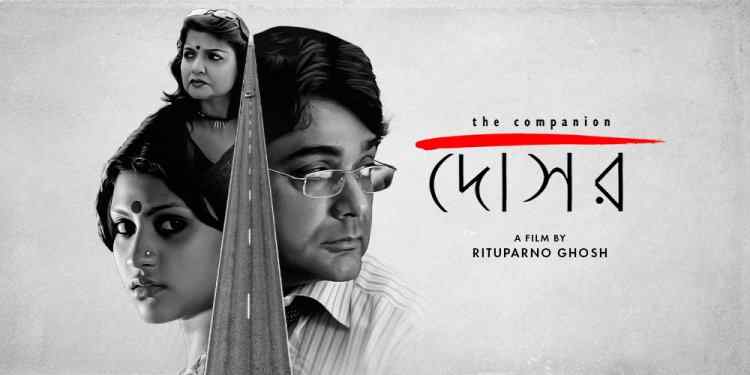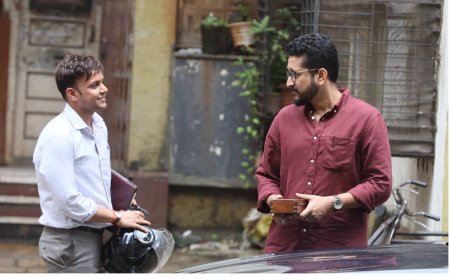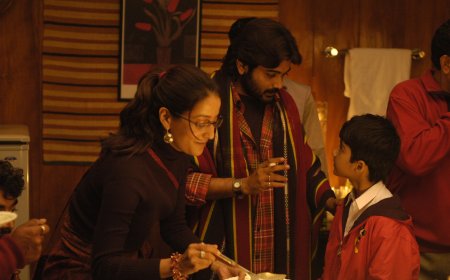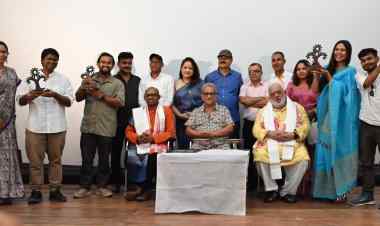LOOKING BACK AT DOSAR (2006) AND URBAN MARRIAGES
In her scholarly work, Dr. Shoma A. Chatterji discusses the film DOSAR (2006) in relation to the notable milestone of Rituparno Ghosh becoming sixty years old on August 30th.

Rituparno Ghosh, the only young director who showed promise of carrying forward the legend of Satyajit Ray, Mrinal Sen, Ritwik Ghatak, Tapan Sinha and others, turned sixty on August 31, 2013. Let us take this opportunity to celebrate his memory with a tribute to his only Black-and-White film called Dosar (2006) an unusual exploration of the man-woman relationship within and without contemporary urban marriages.
The opening frame shows a young woman caught in silhouette with her back to the camera, standing on a balcony overlooking the river singing a sad and pensive Tagore song. The camera cuts backwards to a scene in a restaurant showing a young couple. The man suggests a long weekend in August, possibly in Darjeeling. The woman is uncertain and recalls her son Babua at home. Koushik (Prosenjit) is married to Kaberi (Konkona Sharma) while Mita (Chandreyee Ghosh) is also married but uses her maiden name.
The camera once again cuts into the hotel room the two shared being remade by the housekeeping staff, preparing perhaps for another similar couple to spend a passionate weekend outside marriage bonds. The camera moves to the streets outside the hotel, closing in mid-shot to people sitting in a street side tea stall. The soundtrack fills with a car crashing on the streets but the crashing is kept beyond the frame, shown through response shots of people crowding in to watch. The prologue ends.
On the surface, Dosar is a story of a husband-wife relationship in contemporary urban India represented by Kolkata. Probing a bit deeper, it represents Rituparno’s interpretation of a Shirsendu Mukherjee story that points out the proliferation of adultery within apparently content married relationships that are as fragile as glass. It is a very low key film without any high notes in dialogue, visuals and music.
The infidelity of Kaushik is just a microcosm of similar infidelities among other young couples shown both within and without the story of the film. Brinda (Pallavi Chatterjee) who belongs to Kaberi’s theatre group is having a torrid affair with Bobby (Parambrata Chatterjee), a much younger member of the same group. Brinda is married but appears to have a violent husband. However, whether the violence comes out of his naturally violent nature or out of his suspicion about his wife’s affair with a younger man remains ambivalent. Rituparno tries to provide some logic. Kaberi’s friend Brinda’s pregnancy suggests the end of the affair. “Can’t a woman love two men at the same time?” she asks Bobby when he is shocked that she is still sleeping with her husband and expresses doubts about the paternity of the unborn baby.
Mita, the colleague Kaushik shared torrid weekends with, is a married woman with a small son. Yet, her affair with a male colleague goes on. These incidents do away with questions of gender bias because husbands and wives are equally promiscuous in marriage. Kaushik does not suffer from pangs of guilt for having betrayed his wife’s trust. He suffers because he watches his wife suffer. He suffers when he learns his companion is dead. Brinda on the other hand, begins to feel guilt pangs after her pregnancy test shows positive results. She is trapped between a marriage she does not wish to come out of and a relationship she wishes to sustain. This sub-plot ends inconclusively.
Dosar is a point-of-view film told mainly from the perspective of the wife, Kaberi. The music by 21 Grams, a then-newly formed music group is beautiful because it is as subtle and as low-key as the film is. The Tagore number, a rarely heard one, fits into the pensive opening frames of the film belted out by Chandreyi who plays Mita. The cinematography in Black-and-White jells into the grey mood of the entire film where characters fall somewhere along the ten different shades between the two polarised extremes of black at one point and white at the other.
The fact remains that the stark images fleshed out more in greys than in pitch black or pure white invests in the texture of the cinematic language the film speaks in with a tangible feel robbed of the gloss and the glamour colour would have brought in. The cinematography capitalises on the interplay of light and shade and a certain amount of mystique gets woven into the narrative in this process of exploration and discovery.
Prosenjit playing Kaushik who is denied physical mobility almost throughout the film, fleshes out his performance so well that though his character is painted in negative shades, the audience does not hate him and even begins to sympathise with him along the way. He struggles through bandages and dressings on his face, his hand, his leg, coping first in a wheel chair and then on crutches, finding it an uphill climb even to move from one room to the next, or to wash his face, bringing across a Prosenjit we did not know.
Konkona fills in the blanks in her character will multiple shades of anger, hurt, shock, trauma, disbelief and disgust without shouting or making a scene except at one point when Kaushik’s boss and his wife visit the hospital. But she apologizes to them later on the phone. Pallavi as Brinda is natural in her confusion between the two men in her life where one offers security and the other gives her sexual fulfillment. Emotions are tied to both desires. Shankar Chakraborty in a brief cameo as Mita’s husband is brilliant in his silences, his quiet, simmering anger, his vulnerability in his present situation and his helpless anger vented on his wife’s lover’s wife.
There is a beautiful, visual metaphor that underscores Rituparno’s imaginative use of suggestion. It shows the hotel room being done and redone again and again making space for more (adulterous) couples after Kaushik and Mita vacate it. The camera intercuts into scenes of love-making of an unknown couple with a focus on the woman, slightly middle-aged who has come to spend a weekend in the hotel with a male partner. The camera closes on bed sheets being folded and refolded, upholstery being turned around, the mattresses being changed several times. The departure of the couple remains away from the frame. The camera points this through shots of the bed sheets being taken away to be replaced by fresh ones. This makes for a sharp cinematic suggestion on the frailty of marriage within urban Bengali families in Kolkata.
“He has not committed a mistake. He has committed a crime,” says an angry Kaberi once, considerably blurring the lines that divide a ‘mistake’ from a ‘crime.’ A ‘mistake’ is committed inadvertently and is more often, a one-off act and not a long-standing one. Adultery is a crime because the legal statutes of the country hold it as a punishable act. It is a moral crime because it violates the sanctity of a married relationship that assumes monogamy as a given and rules out adultery in any form by any partner. It is a moral crime because it is done deliberately, in cold blood, unknown to the other partner. In this sense, Kaushik has committed a crime so far as his wife is concerned. On the other hand, the same Kaberi who is so judgmental about her husband actually encourages her friends Brinda and Bobby who have recently spent a weekend in Mukut Monipur to carry on with their affair.
Adultery is a social crime because whichever partner indulges in adultery, he/she not only violates the faith that holds the relationship together, but also humiliates and insults the other partner. For Kaushik and Kaberi, the splash in the media about the accident because of Kaushik’s high profile job turns the accident into an ugly, public scandal that some begin to enjoy. Kaberi’s landlady for example, makes allegations about Kaberi having resorted to black magic in a very convoluted manner. “The driver’s seat is the most dangerous place. Yet, nothing happened to him but the lady sitting beside him died.” She relates a similar story about a relative who resorted to black magic to get rid of the ‘other woman’ in her husband’s life. Kaberi is stunned.
The stronghold of patriarchy within the corporate world is a significant and strong suggestion. Kaushik’s close friend from his firm cheerfully describes to Kaberi in great detail how Mita’s name, identity and very existence have been erased from every single record of the company. It is as if she never existed! For Kaushik, the situation is reversed. They are waiting for him to take on from where he had to stop because of the accident. The company volunteers to bear all expenses of his medical treatment though Kaberi quickly points out that the accident had nothing to do with anything ‘official.’ Floral bouquets quickly take up all the room in Kaushik’s nursing home till they begin to dry up and rot. Kaberi does not want to take them home but later, we find some pots of cacti resting on the dashboard of her car.
Is Kaberi shocked because of the accident? Or is she shocked by the discovery of her husband’s infidelity through the accident? This depicts a tussle between a woman’s emotions and a woman’s ego that struggle to find a slot in her life. It is difficult to make such critical choices between ego and emotions because in the end, it is ego that surrenders to emotions. But does this happen because Kaberi is a woman for whom emotion always wins over ego and pride? Or, does this happen because she wants to keep the marriage going? Or is it because she does not really have a choice like Brinda does in a boyfriend like Bobby? These questions, if one can see and read them through the film, remain unresolved, leaving ripples of uncertainty in the ‘bond’ called ‘marriage.’
Dosar translates in English to ‘Companion.’ Who is the ‘companion’ here? Is it Kaushik who finally finds companionship with wife Kaberi? Or, does Kaberi discover companionship within herself after the shock of being betrayed – emotionally and physically? Or, is there a suggestion of ‘companionship’ between Kaberi and Kalyan, both betrayed in their marriages by their respective partners and find common ground in this betrayal? No one knows. These questions keep dangling in the air, vacillating in a vacuum and this is precisely what makes Dosar so universal, memorable and a milestone in cinema that is a celluloid interpretation of literature.
***
What's Your Reaction?

































































